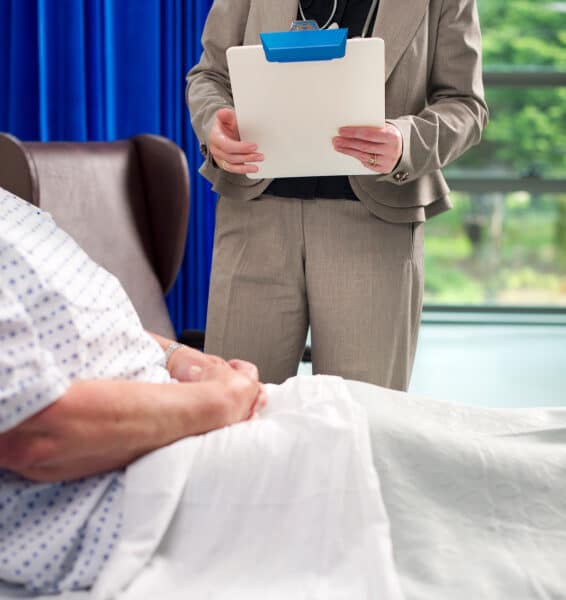 If you have ever had to support a service user as an inpatient on a general hospital ward, you will appreciate the need to educate doctors and nurses in positive approaches to people with learning disability.
If you have ever had to support a service user as an inpatient on a general hospital ward, you will appreciate the need to educate doctors and nurses in positive approaches to people with learning disability.
Lee
Lee was an 18-year-old man with profound learning disability who was also totally blind. He needed to be admitted to hospital to have his wisdom teeth removed and a member of his staff team duly accompanied him. He was admitted by a keen young medic who clearly realised all was not as it might be with Lee’s responses to his earnest questioning. The carer made a point of directing questions to Lee through respect for his rights, but Lee was non-verbal and so the carer would also respond accordingly.
Every question was directed to the carer. So it went something like:
“Does he have any pain?”
Carer – “ Lee, the doctor wants to know if you are hurting. I think we should explain that when you feel pain, you can become noisy and sometimes hit out. Right now you are calm, so perhaps there is no pain at the moment.”
“How bad is the pain?”
Carer – “Lee, are you hurting now? I don’t think you are, as you are quiet and calm.”
“Can he take paracetamol?”
Carer – “Lee, you haven’t had any bad reactions to paracetamol before, have you?”
After a time, the medic became rather cross with the carer, and insisted that Lee should be allowed to speak for himself. The carer pointed out that Lee did not speak. He also pointed out that, since Lee was blind, it was helpful if he could have circumstances and events explained slowly to him.
The medic laughed. “How do you know he is blind, if he can’t actually tell you that? How do you know?”
He then waved his arms about in front of Lee’s face. Lee flinched – the sound, smell and noise made him start.
“Lee,” said the carer, calmly, “shall I explain to the doctor that you have no eyes? Shall I explain that this is the reason you cannot see?”
Exit shamefaced doctor, but probably only to lick his wounded pride. I hope he learned something, but sadly recent media coverage suggests otherwise.
Many people with learning disability enter hospital (like the rest of us) frightened, disoriented and in pain or distress. The staff are pushed for time and are up against untold pressures, so the time and patience needed to get to know a patient is not there. Sometimes the health emergency will not allow the niceties of directing questions at a person in the style and pace they understand. As a supporter of your client, you are the key person in this equation.
Provide a good example
Let your behaviour provide a good example of how we should support people with learning disabilities in hospital. Use the tools available to prepare them as much as possible for the experience. Develop a report of the important information you will need; next of kin, allergies, medicines, communication needs, level of personal care assistance, mobility. Make it easy to access and person-centred.
A young lady I know has just spent a tortuous seven nights in hospital while a continuous array of specialists attended her. She has injured herself severely in an outburst of stressed behaviour, as was her habit. Staff supporting her had taken her to be checked out, as her face was swollen, affecting her vision and speech. From the maxillofacial team, to plastics, they all needed to see her. All the while she had to be contained in a side ward, becoming ever more distressed and agitated. To counteract the inevitable self-injury, they sedated her and restraints were used. The doctor in charge of the case had said she was actually fit to discharge home, but rather than arrange outpatients appointments to appraise her injuries once healing had begun, they felt it better to keep her in. Easier for the doctors.
Of course her staff team put up a fight, and eventually the hospital saw sense and sent her home. But not before she had suffered further injury and been medicated to the point of being unable to stand unaided.
Read Jim Blair’s work on the core principals of Getting it Right for People with a Learning Disability. Jim is consultant nurse for learning disabilities at Great Ormond Street Hospital, but this is not wisdom just for children.





